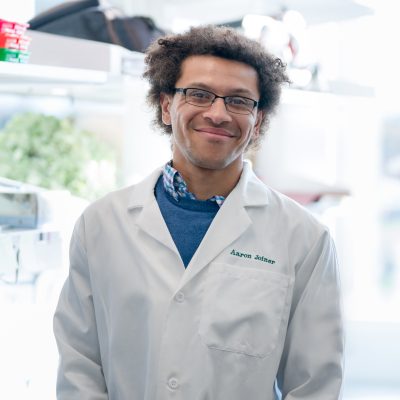Alumnus Spotlight: Aaron Joiner, Ph.D. ’20

November 2, 2020
Aaron Joiner, Ph.D. ’20, is a recent alumnus of the biochemistry, molecular, and cell biology program at Cornell, from which he holds a doctorate. Having successfully defended his dissertation over Zoom, he will be starting a position as a postdoctoral researcher at UC-Berkeley.
What is your area of research and why is it important?
My area of research is structural biology, where I focus on proteins involved in membrane trafficking events. Structural biology is incredibly important because knowing the structure of a protein allows us to understand how it’s working in detail. Membrane trafficking is a field devoted to studying how cells move various components between different organelles inside of the cell or to its exterior. All of these movements are regulated events. In my work, I aim to understand how normal cells function, which can eventually lead to insights for the study of various diseases.
What are the larger implications of this research?
From a structural perspective, having a detailed understanding of how each protein is coming together to do its work can lead to insights for therapeutics. Many labs around the country and the world use a structural approach to define various drug targets. The dysregulation of trafficking events is linked to numerous disease states.
What inspired you to choose this field of study?
I’m attracted to simple, fundamental questions that have big implications. In order to generate a holistic understanding of the function of a protein (or anything really, a bicycle, a car’s engine, a windmill), you need to know what all of the parts are and how those parts come together (what the entire protein looks like). Without that information, you’re not getting a full picture to answer the questions that you’re asking. How the cell moves something from point A to point B is, at its essence, a very simple question, even though in practice it is a very complex system with built-in redundancy.
What were the benefits to defending remotely and online rather than in-person?
The biggest benefit was being able to invite many, many more people than I would have been able to invite originally. It was incredibly helpful and important for me to be able to have my immediate family present. Also, it allowed me to invite people from my past who played a large role in helping me become successful academically. It was really powerful to be able to share that moment with all of the people who have been instrumental to my success.
Another perk is that it was recorded, so I can watch it to help me understand more about my speaking and presentation style. I can use that as feedback. Also, once you have a handle on giving a Zoom presentation, it can be useful in that you can have your notes more readily available. In case extra questions come at the end of the talk, you can have other supplementary materials prepared that you wouldn’t normally have ready at your disposal.
How many people Zoomed in for your defense and would this number have been different in-person under pre-pandemic circumstances? Were there any viewers who would not have been able to attend in-person pre-COVID?
I had about 80 people attend my Zoom defense. For an in-person defense, without coronavirus regulations, I would have expected around 25 to 35 people in attendance, mostly the faculty from the department, more junior students, and my peers. I’m from Wisconsin originally and my mother probably would not have traveled for the defense, nor would several key mentors from the past.
How did the months of remote work leading up to your defense prepare you for defending online via Zoom?
Prior to my defense, I had presented several seminars via Zoom which made it easy to navigate.
What are your hobbies or interests outside of your research or scholarship?
I am really devoted to increasing diversity in academia and improving the climate and sense of inclusion at Cornell (and in my field broadly). I spent a lot of time on outreach initiatives through participating in the Graduate Student Ambassador Program and working with the Graduate School’s or the department of molecular biology and genetics’ diversity councils. I also started a shadowing program in collaboration with the New York STEP program where we provide high school students interested in STEM with academic research opportunities at Cornell.
Outside of my professional life, I run and cycle pretty often. Prior to COVID, I was training for an Ironman, but the race was canceled. Throughout my Ph.D., I also played pickup basketball with a really good group of friends. Taking refuge in all of this exercise really got me through some of the tougher stretches of graduate school.
Why did you choose Cornell to pursue your degree?
There were three key factors in my decision: the first was that Cornell offered me a fellowship which had many perks, including a strong community of scholars of color. The second was what was then called the Broadening Experiences in Scientific Training program, which has recently been renamed Careers Beyond Academia. It focused on exposing STEM Ph.D. students to careers other than faculty and when I arrived, I was all for exploring everything. The last thing is the small-town feel of Ithaca. As an exercise enthusiast, I love that I can walk out of my front door, pick a direction, and start running without having to fight traffic.
If you could go back in time to the beginning of your graduate career, what advice would you give yourself?
Remember to have fun and remember that it’s going to be difficult, but you are going succeed and you are having an impact. Just stay focused and stay strong.
Now that you have graduated, what are your plans?
I recently accepted a position as a postdoctoral researcher at UC-Berkeley in a structural biology-related lab. The goal is to continue on the path to becoming an academic researcher.
